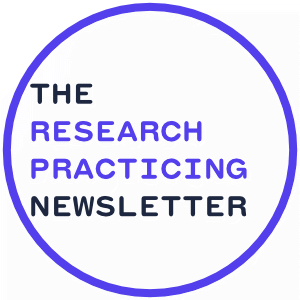Research Practicing for 12 February 2023
Hello!
This is the latest Research Practicing newsletter by Gregg Bernstein. Thank you for subscribing.
I love a good prompt. If there’s anything you’d like to see me cover in a future dispatch, get in touch!
Now here's what's hot off the presses this week at gregg.io:
The coaching tree
At the end of last year, I met with each of my team members individually to share the news that I was leaving Condé Nast to join another organization. At some point in each call, I found myself offering some variation on these words: “I’m leaving your Slack channels, not your life.”
I’m leaving your Slack channels, not your life.
—Me, a broken record, to my team
The thing is, this wasn’t a platitude. I meant it. I’m in the lives of my former teammates as much or as little as they like, from monthly 1-1 calls to quarterly check-ins to an open invitation to text anytime.
In professional sports you’ll hear about the notion of the coaching tree.* My favorite example of this is NBA coach Gregg Popovich of the San Antonio Spurs (and not just because we’re name twins). “Pop” is notable for both coaching and mentoring. The former is evident in his status as the winningest NBA coach of all time, but to me the latter is equally impressive. While his former assistants have gone on to great things in their own coaching careers, they know the door is always open to consult with Pop, and they pay it forward by building their own branches of his coaching tree.
*If you’re keeping track, that’s two posts in a row featuring sports references. I guess this is who I am now.
This is an oversimplification, but for illustrative purposes let’s look at how Pop’s tree has grown:
- Steve Kerr played for Pop’s Spurs before becoming one of his assistants. He is now head coach of the champion Golden State Warriors.
- Mike Brown coached under both Pop and Steve Kerr; he’s now head coach of the Sacramento Kings.
- Becky Hammon was an assistant to Pop; she’s now the head coach of the champion Las Vegas Aces.
- Mike Budenholzer was a longtime assistant on Pop’s staff; “Coach Bud” went on to coach the Atlanta Hawks and won a championship as coach of the Milwaukee Bucks.
- Taylor Jenkins was an assistant to Mike Budenholzer; he’s now the head coach of the rising Memphis Grizzlies and a third generation extension of the Pop tree.
We see this play out in other sports (the NFL’s Mike Shanahan to Sean McVay to Matt LaFleur) and in tech (Andy Grove to John Doerr to a who’s who of founders and leaders). That a coaching tree, poorly nurtured, is a means of perpetuating inequality is a very real issue, and a topic to dive into in its own post.
Toward a durable relationship
I first saw the enduring approach to people management modeled by my colleague David Yee in our time together at Vox Media. David was leaving the organization for another role, but his direct reports, while disappointed, were at peace with his decision to leave. Why? He had already committed to continued monthly 1-1s with his team. The frequency of their interactions might decrease, but David ensured that the relationship—and his mentorship—would persist.
While I had kept in touch with my former teams, I had never thought to create a framework for what ongoing support would look like beyond “Here’s my personal email and my phone number—keep in touch!” Now I am much more explicit in making myself available and offering different levels of engagement.
I remain in close contact with many of my former managers and mentors. I often think, “What would my old manager do in this situation?” And fortunately I know I have permission to message them and ask (hi, Mandy). When someone I worked with asks me a question, it’s never a bother—it’s an honor. And when a former direct report becomes a manager or director, I take pride in their success, and I hope they continue the coaching tree with their own branches long after they share a work Slack.
Managing a team is so much more than setting goals and managing tasks. It’s a commitment to a person and an investment in their growth. While a workplace might be the genesis of a relationship, that relationship should endure far beyond a role or organization.
One great link
The Evolution of Auth0’s (Ops-first) Research Practice. Brad Orego details the evolution of his research team from operations-first to an agency model.
Onward,
Gregg
- Want to offer feedback or a suggestion for a future issue? Hit reply or get in touch here
- Access all my content on my website, gregg.io
- Buy my book, Research Practice
